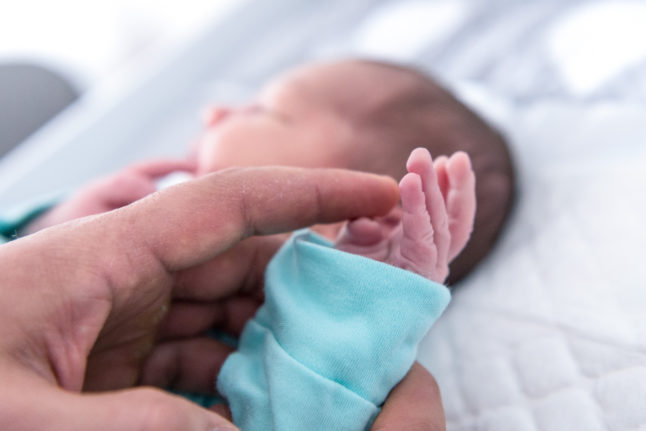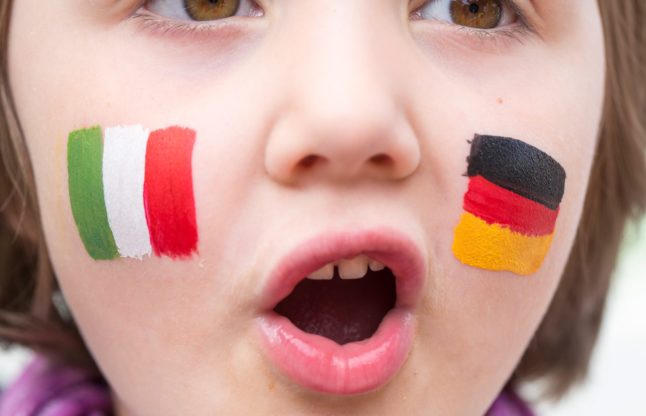When is my child entitled to German citizenship?

Depending on citizenship of the parents and the place of birth, different rules apply for children who want to be German citizens.
Many parents, especially those who are not German citizens themselves, may be wondering under what circumstances their child can acquire German citizenship. In this article, we look at the main ways for a child to become a German citizen, and what steps need to be taken.
Citizenship acquired from German parents
According to the so-called ‘descent principle’, a child becomes a German citizen at birth if their mother or father - or both - are German citizens.
If the parents are married, and if one or both of the parents are German citizens, then the child automatically gains German citizenship.
If only the father has German citizenship and is not married to the mother, then an acknowledgement of paternity is required.
READ ALSO: Berlin government wants to speed up German citizenship process
This can be obtained from the local youth welfare office or registry office before or after the birth, for a fee of €40. An overview of the application requirements can be found here. details here.
This application must be completed at the latest before the child reaches the age of 23.

A father holds the hand of a baby boy just a few days old. Photo: picture alliance/dpa | Sina Schuldt
In many cases, a child of parents with different countries of origin will be registered at birth according to the foreign nationality of the other parent and will therefore have multiple nationalities.
Unlike with other routes to becoming a German citizen, a child who gains their German citizenship through descent may permanently hold dual nationality under current rules.
Children of German parents born abroad
Children who are born abroad, whose German parent was also born abroad after December 31st, 1999, may only acquire German citizenship if their birth is entered in a German register of births within one year. If the German parent was born before December 31st, 1999 and/or within the territory of Germany, the automatic acquisition of German nationality by descent does not change.
Citizenship through adoption
An adopted child can acquire German citizenship if one of the parents is a German national at the time the adoption, if the adoption is legally effective under German law, and if the adopted child is not yet 18 years old at the time of the adoption application.
Citizenship after being born in Germany
The principle of place of birth has applied in Germany since January 1st, 2000. According to this principle, even if neither parent has German nationality, a child born in Germany can become a German citizen, as long as certain conditions are met by either the father or mother.
At the time of the child's birth, at least one parent must have been resident in Germany for at least eight years, and have an unlimited right of residence or a residence permit. (These rules are likely to be liberalised under the current government, however, so watch this space.)
An unlimited right of residence is held by, for example: people with a settlement permit or a permanent residence EC permit, EU citizens who are entitled to freedom of movement, nationals of Iceland, Liechtenstein or Norway who have the same status as citizens of the Union, and Turkish workers and their family members who have a right of residence on the basis of the European Union's right of association with Turkey.

Four-year-old Fenja from Ilmenau had the flags of Italy and Germany painted on her face ahead of the European Championship semi-final in 2012. Photo: picture alliance / dpa | Michael Reichel
Unlike for children who gain their citizenship from a German parent, however, those who acquire their German status from the place of birth principle currently have to choose which citizenship status to keep before they reach the age of 23, under an ‘option obligation’.
READ ALSO: EXPLAINED: How I got German citizenship – and how you can too
This means that, when the child turns 18, they receive a letter from the authorities asking them to choose which citizenship they intend to keep and informing them of the steps they need to take to make this declaration. If they do not make any declaration before their 23rd birthday, they lose their German citizenship.
But - and this is a big "but" - the current traffic-light coalition has promised to allow the holding of multiple nationalities, with the new law potentially coming in as soon as this year. That would mean that children will no longer have to choose between two or more passports.
Until the rules change, there are also a number of exemptions to the rules, including those who are dual nationals of Germany and another EU member state or Switzerland, and for those whose other state of origin doesn’t allow them to renounce their citizenship without difficult or unreasonable conditions. The states that currently do not in enable release of citizenship are Afghanistan, Algeria, Eritrea, Iran, Cuba, Lebanon, Morocco, Cuba, Lebanon, Morocco, Syria and Tunisia.
Citizenship through naturalisation
For children without a German parent or who were not born in Germany, there remains the option of naturalisation.
From the age of 16, children are able to make their own application for German citizenship. Before this age, however, the application must be undertaken by their parent or legal guardian.
READ ALSO: EXPLAINED: What Germany’s new government means for citizenship and naturalisation
For children under the age of 18 without their own income, who are undergoing the application process along with their parents, the application cost only €51. If only the child is applying for citizenship, however, the full fee of €255 will apply.
For children under the age of 16, co-naturalisation is normally possible after three years of living in Germany. The German language requirement can also be simplified for children.
Useful Vocabulary
Place of birth principle - (das) Geburtsortsprinzip
Acknowledgement of paternity - (die) Vaterschaftsanerkennung
Youth welfare office - (das) Jugendamt
Registry office - (das) Standesamt
Option obligation - (die) Optionspflicht
Comments (3)
See Also
Many parents, especially those who are not German citizens themselves, may be wondering under what circumstances their child can acquire German citizenship. In this article, we look at the main ways for a child to become a German citizen, and what steps need to be taken.
Citizenship acquired from German parents
According to the so-called ‘descent principle’, a child becomes a German citizen at birth if their mother or father - or both - are German citizens.
If the parents are married, and if one or both of the parents are German citizens, then the child automatically gains German citizenship.
If only the father has German citizenship and is not married to the mother, then an acknowledgement of paternity is required.
READ ALSO: Berlin government wants to speed up German citizenship process
This can be obtained from the local youth welfare office or registry office before or after the birth, for a fee of €40. An overview of the application requirements can be found here. details here.
This application must be completed at the latest before the child reaches the age of 23.

In many cases, a child of parents with different countries of origin will be registered at birth according to the foreign nationality of the other parent and will therefore have multiple nationalities.
Unlike with other routes to becoming a German citizen, a child who gains their German citizenship through descent may permanently hold dual nationality under current rules.
Children of German parents born abroad
Children who are born abroad, whose German parent was also born abroad after December 31st, 1999, may only acquire German citizenship if their birth is entered in a German register of births within one year. If the German parent was born before December 31st, 1999 and/or within the territory of Germany, the automatic acquisition of German nationality by descent does not change.
Citizenship through adoption
An adopted child can acquire German citizenship if one of the parents is a German national at the time the adoption, if the adoption is legally effective under German law, and if the adopted child is not yet 18 years old at the time of the adoption application.
Citizenship after being born in Germany
The principle of place of birth has applied in Germany since January 1st, 2000. According to this principle, even if neither parent has German nationality, a child born in Germany can become a German citizen, as long as certain conditions are met by either the father or mother.
At the time of the child's birth, at least one parent must have been resident in Germany for at least eight years, and have an unlimited right of residence or a residence permit. (These rules are likely to be liberalised under the current government, however, so watch this space.)
An unlimited right of residence is held by, for example: people with a settlement permit or a permanent residence EC permit, EU citizens who are entitled to freedom of movement, nationals of Iceland, Liechtenstein or Norway who have the same status as citizens of the Union, and Turkish workers and their family members who have a right of residence on the basis of the European Union's right of association with Turkey.

Unlike for children who gain their citizenship from a German parent, however, those who acquire their German status from the place of birth principle currently have to choose which citizenship status to keep before they reach the age of 23, under an ‘option obligation’.
READ ALSO: EXPLAINED: How I got German citizenship – and how you can too
This means that, when the child turns 18, they receive a letter from the authorities asking them to choose which citizenship they intend to keep and informing them of the steps they need to take to make this declaration. If they do not make any declaration before their 23rd birthday, they lose their German citizenship.
But - and this is a big "but" - the current traffic-light coalition has promised to allow the holding of multiple nationalities, with the new law potentially coming in as soon as this year. That would mean that children will no longer have to choose between two or more passports.
Until the rules change, there are also a number of exemptions to the rules, including those who are dual nationals of Germany and another EU member state or Switzerland, and for those whose other state of origin doesn’t allow them to renounce their citizenship without difficult or unreasonable conditions. The states that currently do not in enable release of citizenship are Afghanistan, Algeria, Eritrea, Iran, Cuba, Lebanon, Morocco, Cuba, Lebanon, Morocco, Syria and Tunisia.
Citizenship through naturalisation
For children without a German parent or who were not born in Germany, there remains the option of naturalisation.
From the age of 16, children are able to make their own application for German citizenship. Before this age, however, the application must be undertaken by their parent or legal guardian.
READ ALSO: EXPLAINED: What Germany’s new government means for citizenship and naturalisation
For children under the age of 18 without their own income, who are undergoing the application process along with their parents, the application cost only €51. If only the child is applying for citizenship, however, the full fee of €255 will apply.
For children under the age of 16, co-naturalisation is normally possible after three years of living in Germany. The German language requirement can also be simplified for children.
Useful Vocabulary
Place of birth principle - (das) Geburtsortsprinzip
Acknowledgement of paternity - (die) Vaterschaftsanerkennung
Youth welfare office - (das) Jugendamt
Registry office - (das) Standesamt
Option obligation - (die) Optionspflicht
Join the conversation in our comments section below. Share your own views and experience and if you have a question or suggestion for our journalists then email us at [email protected].
Please keep comments civil, constructive and on topic – and make sure to read our terms of use before getting involved.
Please log in here to leave a comment.